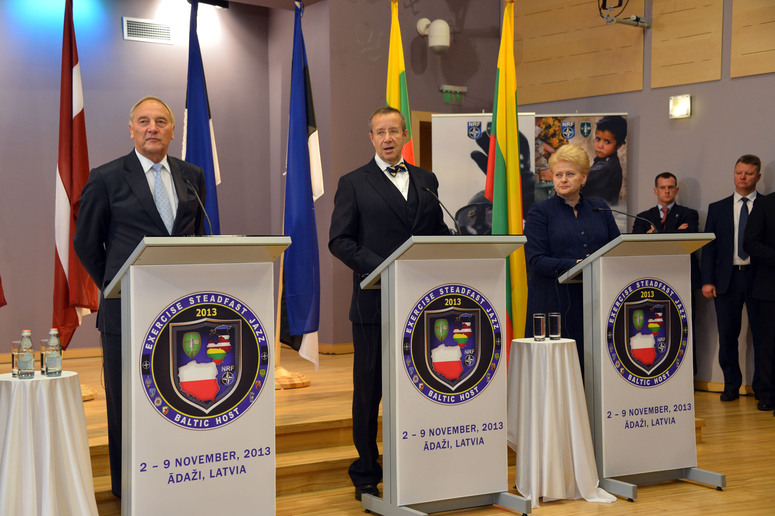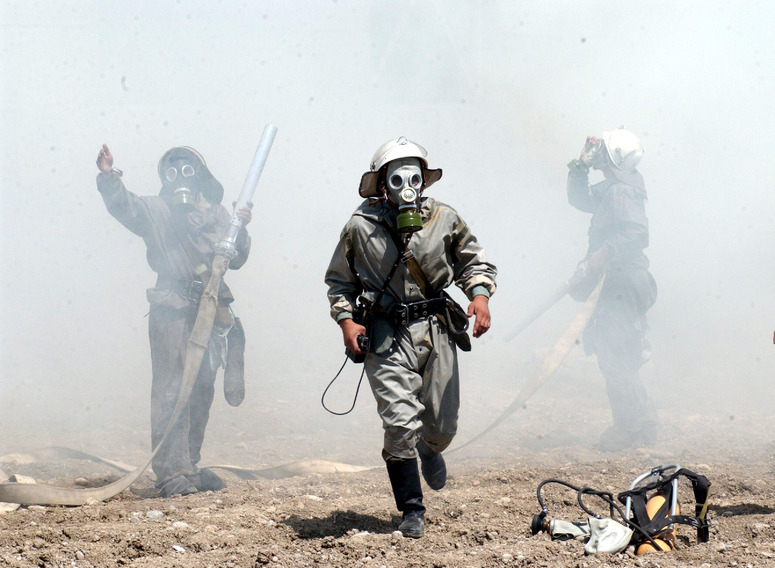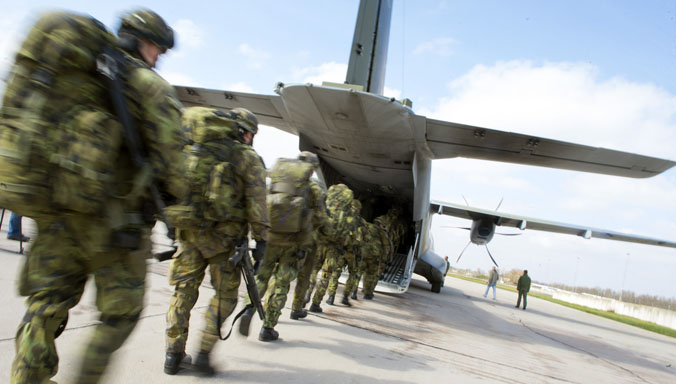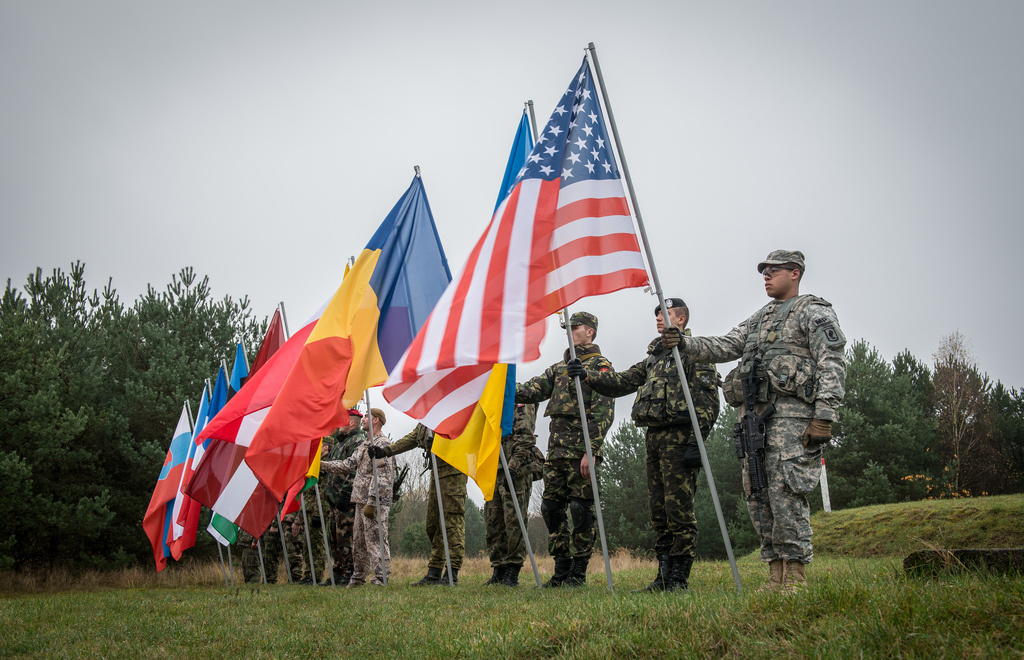If we think back to 2013, the probability of a conventional war in Europe or its Eastern neighborhood was unlikely or minimal. The threat from Russia was not considered a possible issue on the security agenda. Despite the Russo-Georgian war in 2008, Russia was still treated as a partner in the West, hoping that the “reset” would normalize tensions generated by the conflict. Only some Central and Eastern European states like Poland and the Baltic countries were concerned about Russia’s growing military potential (especially after the large scale military exercise ‘ZAPAD 2013’ on Russia’s western borders, involving around 90.000 troops). Recent events in Ukraine demonstrated that these concerns were not without reason. The illegal annexation of Crimea in 2014 marked a significant change in the so called post-Cold War era, reaffirming that conventional threats are still present and can be used as a tool for conducting foreign policy in Europe.
In response to the Ukraine crisis, NATO is undergoing significant changes in improving its ability to act in a new post-Crimea security environment. A recently published RAND report on reinforcing deterrence on NATO’s Eastern flank notes that NATO is not able to “successfully defend the territory of its most exposed members,” including the Baltic States. The reason for this is that only after the Ukraine crisis, which is still unfolding, has NATO started to invest in its infrastructure in the eastern part of the Alliance. Decisions made in Wales – the introduction of the RAP (Readiness Action Plan), the creation of the VJTF (Very High Readiness Joint Task Forces), as well as the establishment of FIUs (Force Integration Units) – have significantly raised the Alliance’s capabilities to ensure the security of its Eastern territories. However, the three Baltic States are still unable to deter Russia or respond to its possible aggression, and call for a long-term Alliance commitment to strengthen the security of their territories.
This article discusses the key priorities of the Baltic countries for the 2016 NATO Summit. The summit, which has already been described by some analysts as historic, could become a remarkable step in a new NATO transformation period, further strengthening NATO’s long term capabilities and significantly increasing the Baltic countries’ deterrence potential vis-à-vis Russia.
Bolstering NATO’s Deterrence
One of the issues concerning long-term adaptation is to increase NATO’s ability to adapt to a changed security environment and deter new security threats. Located next to NATO’s Eastern border, the Baltic countries are especially concerned about the security threats coming from Russia and countermeasures to deter them.
In order to improve deterrence in the region, Lithuania, Latvia, and Estonia call for a permanent presence of a brigade-sized NATO unit in their territories. Growing military asymmetries alongside the borders with Russia (especially in Kaliningrad, where Russia is deploying tactical Iskander-M missile systems, with a range of 500 kilometres, capable of reaching all three Baltic countries), permanent violations of Baltic States’ airspace without any authorization (in 2014 Lithuanian and Latvian airspace was approached by Russian military planes more than 150 times each), and increased information warfare and demonstration of military readiness seriously hinder regional defense capabilities. Russian military buildup in Kaliningrad, and close military cooperation with Belarus threaten to cause an A2/AD (anti access-area denial) situation, preventing the allies from entering the Baltic Sea region in the event of an emergency. To avoid such a situation, the Baltic countries need to rebuild their military capabilities. However, although all three countries made significant political decisions in order to strengthen their armies (e.g. Latvia and Lithuania increased their defense spending, and Lithuania has also reintroduced military conscription), they are unable to deter Russia alone. Only the deployment of additional troops on permanent bases in each country would increase their deterrence capacities against Russia and ensure that NATO is ready to defend its territory without delay.
Recently, NATO defense ministers approved new reinforcements to strengthen the Alliance’s deterrence posture on the Eastern flank, with more assurance measures, including planes, a naval presence in the Baltic Sea, and boots on the ground. It is a significant step moving from reassurance to deterrence. For the Baltic countries, it is extremely important that these additional reinforcements be in place for as long as necessary, while Russia is posing a potential military threat to the region.
Strong US Leadership and Engagement in Europe
The US is undoubtedly the most significant security partner for the Baltic countries. Its leadership in the region is needed on both multinational and bilateral levels. A sharp decline of US forces in Europe during the past decade has worried its counterparts in the Baltic Sea region, which have always preferred greater US involvement in European security.
Operation Atlantic Resolve, launched in 2014 as a response to Russia’s actions in the neighborhood plays a great role in preserving the stability of the Baltic Sea region. As the biggest NATO contributor, the US is seen as a key element in resisting Russian ambitions in its neighborhood. All Baltic countries have declared their strong interest in keeping the US involved in regional security. Even before the Ukraine crisis, Estonian President T. Ilves noted that “the Baltic States need the United States of America, and its presence is as important for us as it was in the 20th century, when the United States ensured the security of democratic Europe during the Cold War.” Europe, especially the Baltic countries, as ever before, needs America’s leadership.
Future Relations with Russia
Defining future relations with Russia is also a part of NATO’s long-term adaptation. Following the Ukraine crisis, NATO has suspended civilian and military cooperation under the NATO-Russia Council; however, not all NATO countries see Russia as an uncooperative adversary, and seek closer cooperation with it.
After the Paris attacks in 2015, France’s president called for closer cooperation between Russia and the US in fighting Daesh. President Hollande supported the idea of a united international coalition, including Russia working together to eradicate radical Islamic groups. Nevertheless, Russia’s return to the stage of world politics by solving the Syrian crisis has raised serious doubts about Russia’s real intentions, especially taking into account its illegal actions in Ukraine. The Baltic countries have a clear stance towards Russia: the Russian president is not interested in being a Western partner, and no further cooperation could be tightened if Russia violates commonly agreed upon principles and is engaged in aggression against Ukraine and Georgia.
Briefly speaking, the key interest of the Baltic countries in Warsaw is to see visible, sustainable and operationally significant decisions, increasing the Alliance’s deterrence posture and sending a clear message that the security of all NATO members remains indivisible. However, it does not mean that other security risks emanating from the Middle-East or Southern Europe are irrelevant for the Baltic countries. Understanding the interests of all NATO member states is of great importance for the future of NATO. The three Baltic countries are ready to work together with their allies in strengthening NATO’s long-term abilities to address any security issues threatening the credibility of the Alliance.
Photo Credit: North Atlantic Treaty Organization




